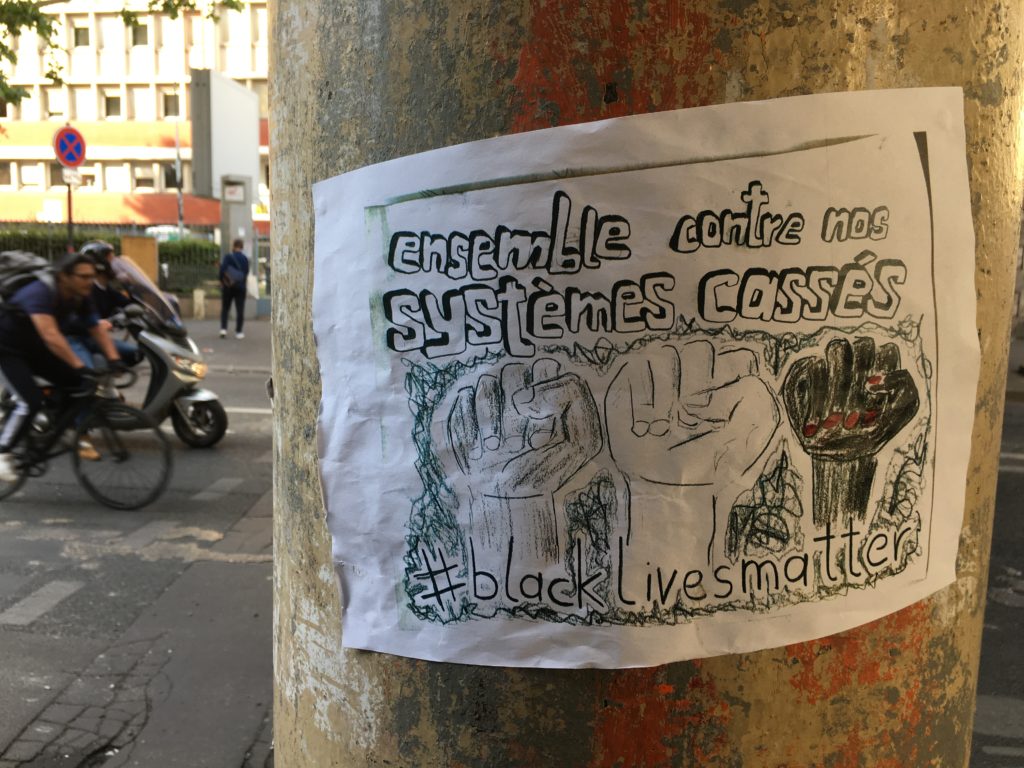Looks like anti-racism is contagious

So, apparently, we’ve endangered the French Republic. “We” here is US academics who talk about race. And “endanger” seems to mean that the idea that racism needs to be taken seriously as a global historical phenomenon might require some difficult reflection on the part of a supposedly colorblind formal imperial power with endemic problems of segregation, discrimination, and exclusion.
Count me in.
Onishi’s NYT piece draws attention to two crucial dynamics of the current French debate that need some extra emphasis.
First, there is the identification of critique with “American” ideologies:
But far from being American, many of the leading thinkers behind theories on gender, race, post-colonialism and queer theory came from France — as well as the rest of Europe, South America, Africa and India, said Anne Garréta, a French writer who teaches literature at universities in France and at Duke.
“It’s an entire global world of ideas that circulates,’’ she said. “It just happens that campuses that are the most cosmopolitan and most globalized at this point in history are the American ones.’’
It makes a sad sort of sense that those rallying in defense of “Western” civilization assume that meaningful critique can only come from within that tradition (though the US has regularly been cast as a suspect, young member of the family). But not only are there plenty of French voices (see next point), but we are all indebted to scholars from outside the West whose perspectives are invaluable when wrestling with the consequences of race and empire (Fanon, Trouillot, the entire Subaltern Studies Group and its many offshoots…).
This intersects with another crucial point: that the public voices of dissent within France itself are also changing:
Behind the attacks on American universities — led by aging white male intellectuals — lie the tensions in a society where power appears to be up for grabs, said Éric Fassin, a sociologist who was one of the first scholars to focus on race and racism in France, about 15 years ago.
Back then, scholars on race tended to be white men like himself, he said. He said he has often been called a traitor and faced threats, most recently from a right-wing extremist who was given a four-month suspended prison sentence for threatening to decapitate him.
But the emergence of young intellectuals — some Black or Muslim — has fueled the assault on what Mr. Fassin calls the “American boogeyman.’’
“That’s what has turned things upside down,’’ he said. “They’re not just the objects we speak of, but they’re also the subjects who are talking.’’
White scholars’ interventions can be written off as somewhat eccentric, based in misunderstandings of the French experience. Scholars of color who draw from their own experiences and embody the very contradictions they seek to expose–their truth is terrifying to those seeking to maintain the status quo. The “danger,” then, is that the myths of French exceptionalism will crumble in the face of actual histories and lived presents.
So let’s raise up some of those voices, shall we?
Check out this conversation with Professors Maboula Soumahoro and Mame-Fatou Niang from this past summer. Not only do they offer a clear view into their own work as anti-racists in the French context, but they also both address how their transatlantic scholarly trajectories have supported their work. Niang here further explains the ways that black women in particular were left out of French stories in such a way as to leave her only with African-American examples as a start (hence her drive to make the documentary Mariannes Noires as a corrective).
For more on how the French adoption of #BlackLivesMatter is not a mere transplant but rather an idea adapted to and translated through local French experiences, take a listen to Professor Pap Ndiaye speaking at Duke last fall.
And, of course, pay attention to Assa Traoré, sister of Adama Traoré, who died in French police custody in 2016, and a central figure in the current French fight to recognize and address racism and social injustice.
And if you want to see what some US colleagues are saying about the ways the French and US struggles actually interact, read Prof. Jean Beaman’s short piece on Minneapolis in Paris from this summer and Prof. Tyler Stovall’s latest book on the history of racism’s connection to freedom in both republics.
French Republics are most in danger when they fail to live up to their ideals. It’s time to stop pretending that some nice language about liberty, equality, and fraternity are enough to confront a system riddled with racist assumptions or to address the real harms done every day in the name of Republican values.
And, yes, that’s just as true here in the US (or in Classics…).
